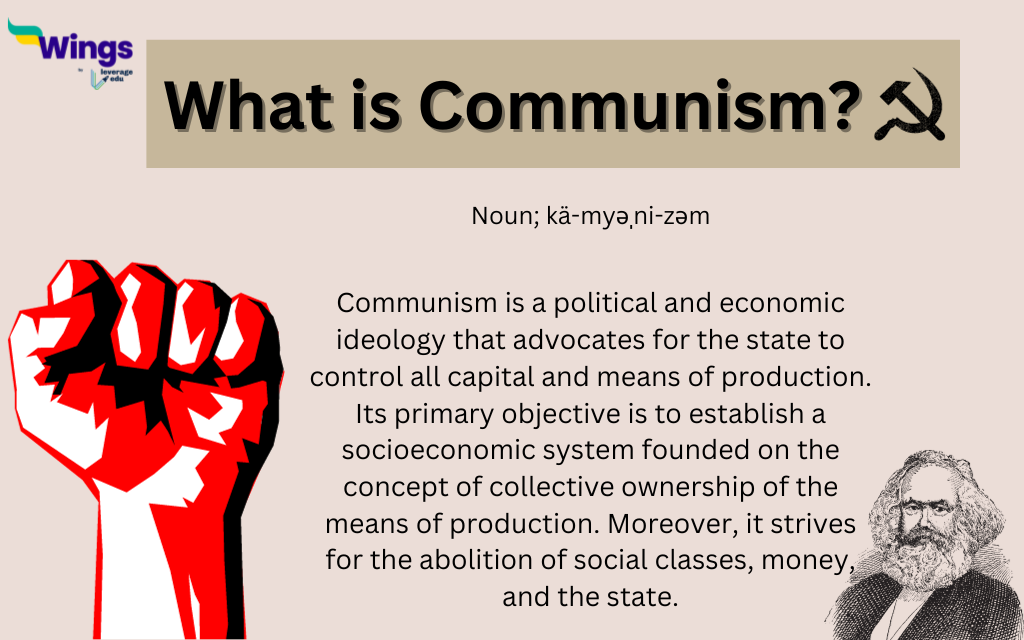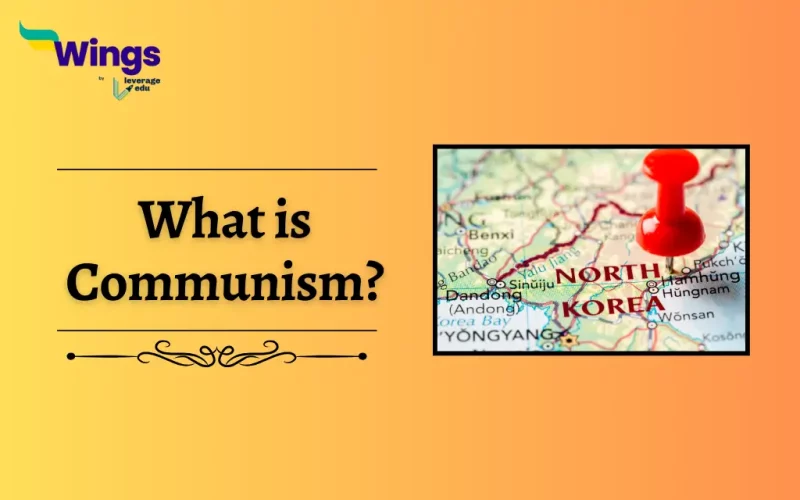Communism is a political ideology. It is a type of government where the State owns the main resources, including means of production, property, education, agriculture, and transportation. Furthermore, it proposes a society where everyone equally shares the benefits of labour, therefore eliminating the class system by redistributing income. Let us see what is Communism!
Table of Contents
Definition
Communism is a political and economic ideology. Additionally, it aims to establish a socioeconomic order that is based on the ideas of common ownership of the means of production. Moreover, it believes in the absence of money, social class, and the state.

Also Read: What Is Fascism?
Beliefs of Communist Ideology
Karl Marx is known as the Father of Communism. He proposed this ideology in a book named Communist Manifesto which he wrote with Friedrich Engels. The manifesto focused on the following beliefs:
- Class struggle in all historical societies
- The instability created by capitalism
- Equal division of labour profit
History and Timeline of Communism
Here is the History and Timeline of Communism:
| History and Timeline of Communism | |
| 7th November, 1917 | Emergence of the Soviet Union, the first communist government, after the October Revolution inspired by The Communist Manifesto. |
| 1st July, 1921 | Inspired by the Russian Revolution, the Communist Party of China was formed. |
| 21st January, 1924 | Lenin dies and Joseph Stalin eventually takes over, industrializing the country with a state-controlled economy. However, this led to famine. The world witnesses the Great Purge. |
| 8th May, 1945 | World War II ends. U.S.S.R. declares victory over Nazi Germany. |
| 9th May, 1945 | Cold War begins. |
| 7th September, 1945 | Korea was divided into the Soviet-occupied communist North and the United States-occupied South. |
| 12th March, 1947 | Under President Harry S. Truman the U.S. provides defense from communist takeovers by entering into the wars in Vietnam and Korea. |
| 1st October, 1949 | After the civil war, Mao Zedong, China’s Communist Party leader, declares the creation of the People’s Republic of China. The US ends diplomatic ties with China. |
| 1st January, 1959 | Fidel Castro takes over Cuba and makes it a Communist state. |
| 25th April, 1975 | Formation of the Socialist Republic of Vietnam under Communist rule. |
| 9th November, 1989 | Fall of the Berlin Wall. |
| 1989-90 | Collapse of communist regimes in Hungary, Czechoslovakia, Bulgaria, Romania, Poland, Benin, Nicaragua, Mozambique, and Yemen. |
| 25th December, 1991 | The Soviet Union dissolves with the resignation of Mikhail Gorbachev. |
Also Read: Right Wing V/S Left Wing: Meaning, Differences, Similarities
Communist Countries
In the 1900s, one-third of the world’s population had communist governments. However, today only five countries have a communist form of government:
- North Korea
- China
- Laos
- Vietnam
- Cuba.
Debatably these countries do not meet the true definition of communism. And stand in a transitional phase between the end of capitalism and the creation of communism.
Quiz
Results
#1. Which of the following countries does not have a communist form of government?
#2. When did the Berlin Wall fall?
#3. Who is known as the father of communism?
Communism is a political and economic ideology. It aims to establish a socioeconomic order that is based on the ideas of common ownership of the means of production. It believes in the absence of money, social class, and the state.
On one hand, Communism believes that the working class should be in control of capital and production as well as shared ownership. On the other hand, Socialism believes in a more gradual shift of power from the bourgeois to the working class and is more concerned with the collective good.
Related Blogs
Lastly, we hope you liked our blog and gained an understanding of What is Communism. Moreover, you may even read more blogs and empower yourself with knowledge regarding Civics and Polity!
 One app for all your study abroad needs
One app for all your study abroad needs
















